新目标人教版八年级英语下语法讲解
- 格式:doc
- 大小:32.00 KB
- 文档页数:5
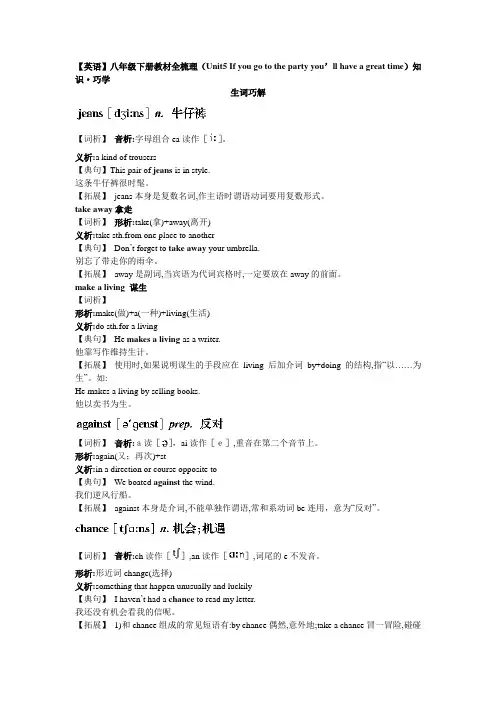
【英语】八年级下册教材全梳理(Unit5 If you go to the party you’ll have a great time)知识·巧学生词巧解【词析】音析:字母组合ea读作[]。
义析:a kind of trousers【典句】This pair of jeans is in style.这条牛仔裤很时髦。
【拓展】jeans本身是复数名词,作主语时谓语动词要用复数形式。
take away拿走【词析】形析:take(拿)+away(离开)义析:take sth.from one place to another【典句】Don’t forget to take away your umbrella.别忘了带走你的雨伞。
【拓展】away是副词,当宾语为代词宾格时,一定要放在away的前面。
make a living 谋生【词析】形析:make(做)+a(一种)+living(生活)义析:do sth.for a living【典句】He makes a living as a writer.他靠写作维持生计。
【拓展】使用时,如果说明谋生的手段应在living后加介词by+doing的结构,指“以……为生”。
如:He makes a living by selling books.他以卖书为生。
【词析】音析:a读[],ai读作[e],重音在第二个音节上。
形析:again(又;再次)+st义析:in a direction or course opposite to【典句】We boated against the wind.我们逆风行船。
【拓展】against本身是介词,不能单独作谓语,常和系动词be连用,意为“反对”。
【词析】音析:ch读作[],an读作[],词尾的e不发音。
形析:形近词change(选择)义析:something that happen unusually and luckily【典句】I haven’t had a chance to read my letter.我还没有机会看我的信呢。
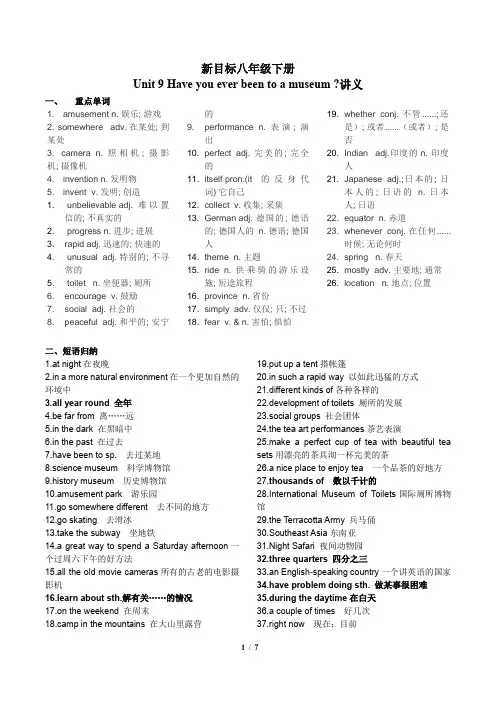
新目标八年级下册Unit 9 Have you ever been to a museum ?讲义一、重点单词1. amusement n. 娱乐; 游戏2. somewhere adv. 在某处; 到某处3. camera n. 照相机; 摄影机; 摄像机4. invention n. 发明物5. invent v. 发明; 创造1. unbelievable adj. 难以置信的; 不真实的2. progress n. 进步; 进展3. rapid adj. 迅速的; 快速的4. unusual adj. 特别的; 不寻常的5. toilet n. 坐便器; 厕所6. encourage v. 鼓励7. social adj. 社会的8. peaceful adj. 和平的; 安宁的9. performance n. 表演; 演出10. perfect adj. 完美的; 完全的11. itself pron.(it的反身代词) 它自己12. collect v. 收集; 采集13. German adj. 德国的; 德语的; 德国人的n. 德语; 德国人14. theme n. 主题15. ride n. 供乘骑的游乐设施; 短途旅程16. province n. 省份17. simply adv. 仅仅; 只; 不过18. fear v. & n. 害怕; 惧怕19. whether conj. 不管......;还是); 或者......(或者); 是否20. Indian adj.印度的 n. 印度人21. Japanese adj.;日本的; 日本人的; 日语的n. 日本人; 日语22. equator n. 赤道23. whenever conj. 在任何......时候; 无论何时24. spring n. 春天25. mostly adv. 主要地; 通常26. location n. 地点; 位置二、短语归纳1.at night在夜晚2.in a more natural environment在一个更加自然的环境中3.all year round 全年4.be far from 离……远5.in the dark 在黑暗中6.in the past 在过去7.have been to sp. 去过某地8.science museum 科学博物馆9.history museum 历史博物馆10.amusement park 游乐园11.go somewhere different 去不同的地方12.go skating 去滑冰13.take the subway 坐地铁14.a great way to spend a Saturday afternoon一个过周六下午的好方法15.all the old movie cameras所有的古老的电影摄影机16.learn about sth.解有关……的情况17.on the weekend 在周末18.camp in the mountains 在大山里露营19.put up a tent搭帐篷20.in such a rapid way 以如此迅猛的方式21.different kinds of各种各样的22.development of toilets 厕所的发展23.social groups 社会团体24.the tea art performances茶艺表演25.make a perfect cup of tea with beautiful tea sets用漂亮的茶具沏一杯完美的茶26.a nice place to enjoy tea 一个品茶的好地方27.thousands of 数以千计的28.International Museum of Toilets国际厕所博物馆29.the Terracotta Army 兵马俑30.Southeast Asia东南亚31.Night Safari 夜间动物园32.three quarters 四分之三33.an English-speaking country一个讲英语的国家34.have problem doing sth. 做某事很困难35.during the daytime在白天36.a couple of times 好几次37.right now 现在;目前38.an amusement park with a special theme一个有特别的主题的游乐园39.walk around the park 在公园里到处走40.hear of 听说41.take a ride兜风42.another province另一个省43.the Bird’s Nest鸟巢44.encourage sb. to do sth.鼓励某人做某事45.on the one hand... on the other hand.一方面,另一方面三、句型集萃1.a great way to do sth一个做某事的好办法2.It’s unbelievable that很难相信……3.watch sb do sth.看某人做了某事4.encourage sb to do sth鼓励某人做某事5.as..as和。
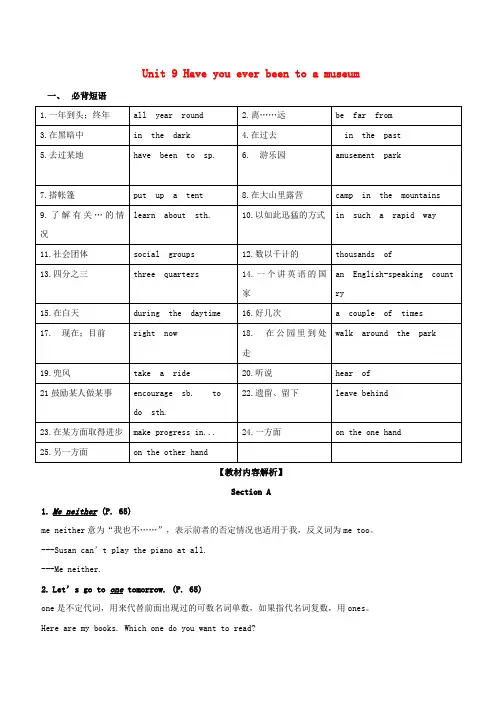
Unit 9 Have you ever been to a museum 一、必背短语【教材内容解析】Section A1.Me neither (P. 65)me neither意为“我也不……”,表示前者的否定情况也适用于我,反义词为me too。
---Susan can’t play the piano at all.---Me neither.2.Let’s go to one tomorrow. (P. 65)one是不定代词,用来代替前面出现过的可数名词单数,如果指代名词复数,用ones。
Here are my books. Which one do you want to read?---I don’t like these dresses.---How about those ones over there.3.Let’s go somewhere different today. (P. 65)somewhere用作副词,表示“在某处、到某处”,常用于肯定句中,在否定句和疑问句中用anywhere。
It’s cold here. Let’s go somewhere else.Did you go anywhere last Sunday?4.They are going to take the subway. (P. 66)take the subway意为“乘地铁”,take用作动词,可以表示“乘、坐(车、船等)”。
We take the subway to work every day.5.It’s a great way to spend a Saturday afternoon. (P. 66)(1) way表示“方法”时,后常接动词不定式或者of doing作定语。
Can you think out a way to open the door/of opening the door?(2) spend的用法① sb. spend+时间/金钱+on sth. “在某事上花费多长时间或者多少钱”The man spent the whole day on his speech.The family spent 10,000 dollars on their trip.② sb. spend+时间+(in) doing sth. “花费多长时间做某事”The boy has spent two hours playing the computer games.【拓展】辨析spend, pay, take和cost6.We put up a tent and cooked outside. (P. 66)put up意为“搭建”,还可以表示“举起、张贴”。
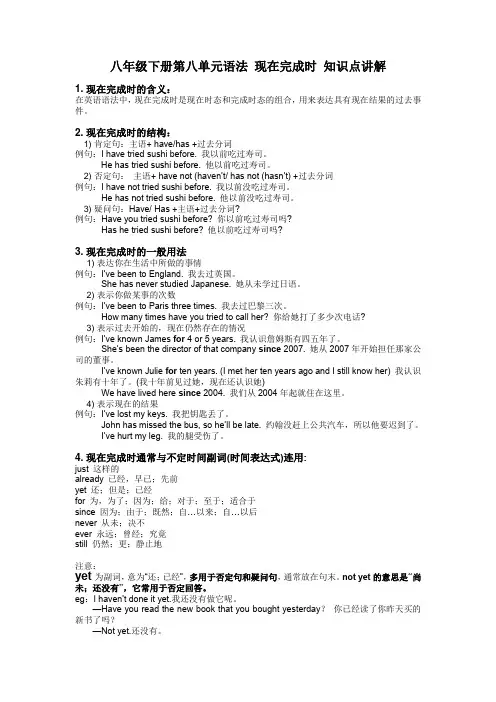
八年级下册第八单元语法现在完成时知识点讲解1. 现在完成时的含义:在英语语法中,现在完成时是现在时态和完成时态的组合,用来表达具有现在结果的过去事件。
2. 现在完成时的结构:1) 肯定句:主语+ have/has +过去分词例句:I have tried sushi before. 我以前吃过寿司。
He has tried sushi before. 他以前吃过寿司。
2) 否定句:主语+ have not (haven’t/ has not (hasn’t) +过去分词例句:I have not tried sushi before. 我以前没吃过寿司。
He has not tried sushi before. 他以前没吃过寿司。
3) 疑问句:Have/ Has +主语+过去分词?例句:Have you tried sushi before? 你以前吃过寿司吗?Has he tried sushi before? 他以前吃过寿司吗?3. 现在完成时的一般用法1) 表达你在生活中所做的事情例句:I’ve been to England. 我去过英国。
She has never studied Japanese. 她从未学过日语。
2) 表示你做某事的次数例句:I’ve been to Paris three times. 我去过巴黎三次。
How many times have you tried to call her? 你给她打了多少次电话?3) 表示过去开始的,现在仍然存在的情况例句:I’ve known James for 4 or 5 years. 我认识詹姆斯有四五年了。
She’s been the director of that company since 2007. 她从2007年开始担任那家公司的董事。
I’ve known Julie for ten years. (I met her ten years ago and I still know her) 我认识朱莉有十年了。
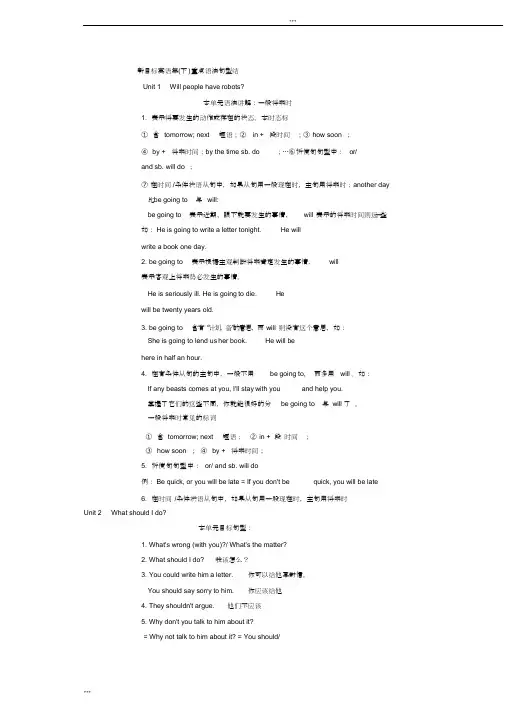
新目标英语年(下)重点语法句型结Unit 1 Will people have robots?本单元语法讲解:一般将来时1. 表示将要发生的动作或存在的状态。
本时态标①含tomorrow; next 短语;②in + 段时间;③how soon ;④by + 将来时间;by the time sb. do ;⋯⑥祈使句句型中:or/and sb. will do ;⑦在时间/条件状语从句中,如果从句用一般现在时,主句用将来时;another day比be going to 与will:be going to 表示近期、眼下就要发生的事情,will 表示的将来时间则远一些。
如:He is going to write a letter tonight. He willwrite a book one day.2. be going to 表示根据主观判断将来肯定发生的事情,will表示客观上将来势必发生的事情。
He is seriously ill. He is going to die. Hewill be twenty years old.3. be going to 含有“计划,备”的意思,而will 则没有这个意思,如:She is going to lend us her book. He will behere in half an hour.4. 在有条件从句的主句中,一般不用be going to, 而多用will 。
如:If any beasts comes at you, I'll stay with you and help you.掌握了它们的这些不同,你就能很好的分be going to 与will 了。
一般将来时常见的标词①含tomorrow; next 短语;②in + 段时间;③how soon ;④by + 将来时间;5. 祈使句句型中:or/ and sb. will do例:Be quick, or you will be late = If you don't be quick, you will be late6. 在时间/条件状语从句中,如果从句用一般现在时,主句用将来时Unit 2 What should I do?本单元目标句型:1. What's wrong (with you)?/ What's the matter?2. What should I do? 我该怎么?3. You could write him a letter. 你可以给他写封信。

新版人教版八年级下英语语法重点归纳(全)一、名词名词是指用来表示人、事物、地方、动物等的名称的词语。
名词分为可数名词和不可数名词。
可数名词有单数和复数两种形式,而不可数名词只有单数形式。
- 可数名词:表示单数时,名词前面通常有冠词a/an或者其它数量词进行修饰;表示复数时,名词通常要在词尾加“s”。
- 不可数名词:不可数名词表示的是无法分为个体的物体、概念、抽象事物等,通常不能用于复数形式。
二、动词动词表示人或物的动作、行为、状态或存在的词语。
动词分为及物动词和不及物动词。
- 及物动词:及物动词后面可以直接接宾语,表示动作的承受者或影响对象。
- 不及物动词:不及物动词不能直接接宾语,它可以后面接副词或介词短语,表示动作发生的方式、状态等。
三、形容词形容词是用来描述名词性词语的词语。
它可以表示人或物的性质、状态、特征、颜色等。
- 形容词可以修饰名词,放在名词的前面。
- 形容词还可以通过加后缀“-er”和“-est”来比较级和最高级。
四、副词副词是用来修饰动词、形容词和其他副词的词语。
副词可以表示时间、地点、方式、程度、频率等。
- 副词在句中通常位于动词、形容词或者其他副词的前面。
- 副词的比较级和最高级可以通过在前面加上more和most来表示。
五、代词代词是用来代替名词或名词性的词语的词语。
代词可以分为人称代词、指示代词、疑问代词、不定代词等。
- 人称代词表示人的身份或人称,包括主格和宾格两种形式。
- 指示代词用来指示特定的人或物,可以表示近处的、远处的或已提到的事物。
- 疑问代词用于提问,通常用来询问人或事物的身份、性质、数量等信息。
- 不定代词用来指代不特定或泛指的人或物,表示数量或程度。
六、冠词冠词是位于名词前面用来修饰名词的词语。
冠词分为定冠词和不定冠词。
- 定冠词指特指某一具体的人或事物,有两种形式:定冠词“The”用于表示特定的人或物,而不定冠词“A/An”用于泛指任意的人或物。
七、介词介词是用来表示人或物之间关系的词语。
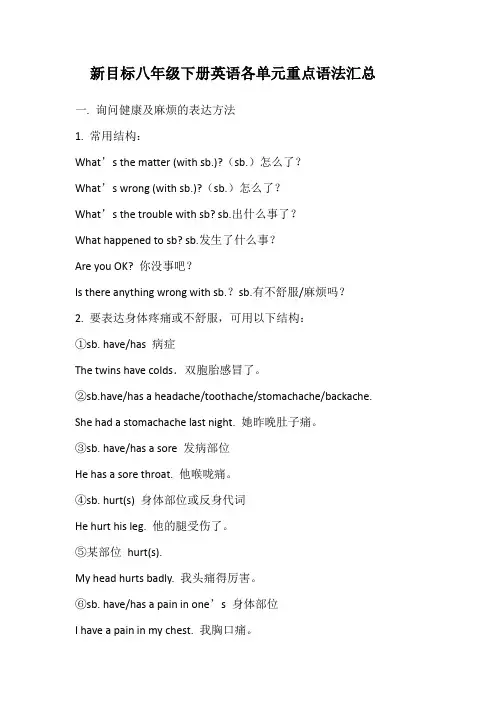
新目标八年级下册英语各单元重点语法汇总一. 询问健康及麻烦的表达方法1. 常用结构:What’s the matter (with sb.)?(sb.)怎么了?What’s wrong (with sb.)?(sb.)怎么了?What’s the trouble with sb? sb.出什么事了?What happened to sb? sb.发生了什么事?Are you OK? 你没事吧?Is there anything wrong with sb.?sb.有不舒服/麻烦吗?2. 要表达身体疼痛或不舒服,可用以下结构:①sb. have/has 病症The twins have colds.双胞胎感冒了。
②sb.have/has a headache/toothache/stomachache/backache. She had a stomachache last night. 她昨晚肚子痛。
③sb. have/has a sore 发病部位He has a sore throat. 他喉咙痛。
④sb. hurt(s) 身体部位或反身代词He hurt his leg. 他的腿受伤了。
⑤某部位hurt(s).My head hurts badly. 我头痛得厉害。
⑥sb. have/has a pain in one’s 身体部位I have a pain in my chest. 我胸口痛。
⑦(There is) something wrong with one’s 身体部位There is something wrong with my right eye. 我的右眼有毛病。
⑧其他表达方式She has a heart trouble. 她有心脏病。
He got hit on the head. 他头部受到了撞击。
She cut her finger. 她割破手指了。
二.情态动词should1. should为情态动词,意为“应该;应当”,否定式为shouldn’t,其后接动词原形,无人称和数的变化。
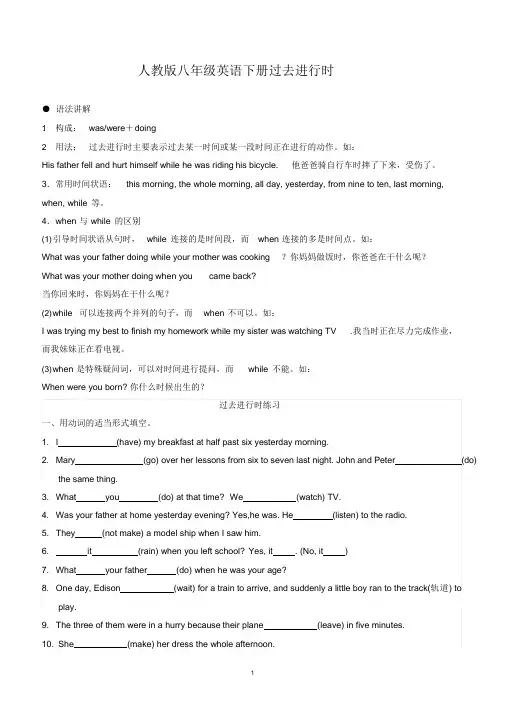
人教版八年级英语下册过去进行时●语法讲解1.构成:was/were+doing2.用法:过去进行时主要表示过去某一时间或某一段时间正在进行的动作。
如:His father fell and hurt himself while he was riding his bicycle. 他爸爸骑自行车时摔了下来,受伤了。
3.常用时间状语:this morning, the whole morning, all day, yesterday, from nine to ten, last morning, when, while 等。
4.when 与while 的区别(1) 引导时间状语从句时,while 连接的是时间段,而when 连接的多是时间点。
如:What was your father doing while your mother was cooking ?你妈妈做饭时,你爸爸在干什么呢?What was your mother doing when you came back?当你回来时,你妈妈在干什么呢?(2) w hile 可以连接两个并列的句子,而when 不可以。
如:I was trying my best to finish my homework while my sister was watching TV .我当时正在尽力完成作业,而我妹妹正在看电视。
(3) w hen 是特殊疑问词,可以对时间进行提问,而while 不能。
如:When were you born? 你什么时候出生的?过去进行时练习一、用动词的适当形式填空。
1. I (have) my breakfast at half past six yesterday morning.2. Mary (go) over her lessons from six to seven last night. John and Peter (do)the same thing.3. What you (do) at that time? We (watch) TV.4. Was your father at home yesterday evening? Yes,he was. He (listen) to the radio.5. They (not make) a model ship when I saw him.6. it (rain) when you left school? Yes, it . (No, it )7. What your father (do) when he was your age?8. One day, Edison (wait) for a train to arrive, and suddenly a little boy ran to the track(轨道) toplay.9. The three of them were in a hurry because their plane (leave) in five minutes.10. She (make) her dress the whole afternoon.11. While we (wait) for the bus, a girl (run) up to us.12. I (telephone) a friend when Bob (come) in.13. Jim (jump) on the bus as it (move) away.14. We (test) the new machine when the electricity (go) off.15. She (not want) to stay in bed while the others (all, work) in the fields.二、选择题1. I a meal when you me.A. cooked, were ringingB. was cooking, rangC. was cooking, were ringingD. cooked, rang2. He said he to draw a plane on the blackboard at that time.A. triesB. triedC. was tryingD. will try3. While she TV, she a sound outside the room.A. was watching, was hearingB. watched, was hearingC. watched, heardD. was watching, heard4. They a football game from 7 to 9 last night.A. were watchingB. watchC. watchedD. are watching5. What book you when I you at four yesterday afternoon?A. did, read, was seeingB. did, read, sawC. were, reading, sawD. were, reading, was seeing6. It was Friday evening. Mr and Mrs. Green ready to fly to England.A. are gettingB. getC. were gettingD. got7. Lei Feng always of others when he in the army.A. is, thinking, wasB. was, thinking, isC. did, think, isD. was, thinking, was8. A girl my pen fall off the table when she me.A. saw, passedB. was seeing, passedC. was seeing, pastD. was seeing, was passing9. We for Tom at ten last Sunday. He often kept us .A. were waiting, waitingB. were waiting, waitC. waited, waitingD. waited, wait10. He his father on the farm the whole afternoon last Saturday.A. helpsB. would helpC. was helpingD. is helping11. While mother some washing, I a kite for Kate.A. did, madeB. was doing, madeC. was doing, was makingD. did, was making12. “you angry then? The”y “too much noise. ”A. Are, were makingB. Were, were makingC. Are, madeD. Were, made13. He some cooking at that time, so he me.A. did, heardB. did, didn ’t hearC. was doing, heardD. was doing, didn ’t hear14. This time yesterday Jack his bike. He TVA. repaired, didn ’t watc B h. was repairing, watchedC. repaired, watchedD. was repairing, wasn watc’hin t g15. His parents wanted to know how he on with his new classmates.A. was gettingB. getsC. is gettingD. will get过去时中考真题Part 11. —What were you doing this time yesterday?—I on the grass and drawing a picture.A. sitB. satC. am sittingD. was sitting2. While I TV, the bell rang.A. watchB. watchedC. am watchingD. was watching3. —Why didn ’t you answer my telephone yesterday?—Sorry. I a bath.A. tookB. takeC. am takingD. was taking4. While the alien a souvenir, the girl called the police.A. was buyingB. boughtC. buysD. is buying5. —I called you at 6 o'clock yesterday evening, but nobody answered.— I'm sorry. I my friend download the movie Kung Fu PandaⅡwhen the telephone rang,A. would helpB. helpedC. was helping6. I along the road when I saw Peter. So we stopped and had a chat.A. walkedB. was walkingC. would walkD. had walked7. —What did the teacher say just now?— Sorry. I didn ’t catch it. I something else.A. thinkB. will thinkC. was thinkingD. had thought8. When I came back yesterday evening, my brother his homework.A is doing B. has done C. was doing9. M rs White dinner when her son came home.A. is cookingB. was cookingC. are cookingD. were cooking10. —D id you see Mr. Black just now?—Yes. He his car when I met him.A. parkedB. was parkingC. parksD. will park11. —Amy, I called you yesterday evening, but nobody answered the phone.— Oh, I a walk with my mother at that time.A. takeB. tookC. am takingD. was taking12. Y esterday evening, I along the street when I suddenly met my maths teacher.A. walkB. walkedC. was walkingD. am walking13.—Where were you at 7:00 last night?— I to my mom at home.A. writeB. was writingC. wrote14. —Why didn ’t you go to play football with us yesterday afternoon?—I my mother with the housework then.A. helpedB. was helpingC. had helpedD. have been helping15. He when the UFO arrived. He didn ’t wake until the UFO disappeared.A. sleptB. was sleepingC. was doing homeworkD. was singing16. I my homework at nine o'clock last Sunday morning.A. am doingB. was doingC. do17. I was very angry with John—he just when I spoke to him.A. isn ’t listeningB. hasn ’t listenedC. didn ’t listenD. wasn ’t listening18. —I called you at 4:00 yesterday afternoon, but no one answered.—Sorry, I with my friends at that time.A. swimB. swamC. will swimD. was swimming19. Mr. Li us a report on our environment when the earthquake happened in Japan.A. gaveB.is givingC. was giving20. —Mr. Lee to a student when I entered the classroom this morning.- He is very patient he is young.A. talking; butB. talks; thoughC. was talking, thoughD. talked, however21.—Were you at school when he came to see you?—Yes, I a math class.A. hadB. was havingC. am havingD. have22. I met a good friend of mine while I on the street.A. walksB. walkC. was walkingD. am walking23. I when the UFO landed.A. am watching TVB. was watching TVC. have watched TVD. watched TV24. The girl with two cats in the yard when the earthquake happened.A. was playingB. is playingC. are playingD. were playingPart 21. Paul and I tennis yesterday. He did much better than 1.A. playB. will playC. playedD. are playing2. A big party was held in NO.18 Middle School last night, the teacher with students singing and dancing happily at the party.A. isB. wasC. areD. were3. Mr. Black is going to marry a girl he in Japan last year.A. meetsB. metC. has metD. would meet4. He went into his room, the light and began to work.A. has turned onB. turned offC. turned onD. has turned off5.—W hat did Mr. Smith do before he came to China?—He in a car factory.A. worked B.works C.is working D.will work6. —Have you ever been to Hong Kong?—Yes, I ___there last month.A. went toB. have beenC. went7. This morning I had hardly got to my school when it to rain.A. had begunB. was beginningC. beganD. begins8.—Y ou have found your lost umbrella, haven ’t you?—Yes. I it behind the door this afternoon.A. have foundB. will findC. found9. Tom, along with three other boys, seen playing football a moment ago.A. isB. wasC. areD. were10. Ten minutes ago, there an eraser, a pen and some books on the desk.A. wasB. wereC. is11. —How was your trip to Hang Zhou, Jim?—Great! We to Xixi National Wetland Park.A. goB. am goingC. will goD. went12. –Do you know who cleaned the blackboard, Tina?-- Yes. John .A. doB. doesC. did13. The last time I to the cinema was two years ago.A. goB. have goneC. have beenD. went14. —Have you ever been to Canada?— Yes, I there last year with my parents.A. have beenB. have goneC. wentD. go15. I called you, but nobody answered. Where you?A. isB. areC. wasD. were16. ---Have you ever been to Shanghai?---Yes. I there a few months ago.A have been B. went C. have gone17. What’s the best present you have ever ?A. receivedB. receivesC. receiving18.—Lin Kai, hand in your homework, please.—Oh, sorry. I it at home this morning.A. was leavingB. has leftC. will leaveD. left19. I'm now in New York with my friend Jenny. We by plane on Monday.A. arriveB. arrivedC. are arrivingD. will arrive20.—Guess What! The great movie is on in the cinem.a一Nothing n ew.I it with my parents on the first day.A. saw B.see C.will see D. have been21. If it had been fine yesterday, we could have watched that air show. But it all day.A. has rainedB. had rainedC. rainedD. rains22. –When your mother you that blue dress, Lucy?–Sorry, I really can ’t rem M e a m ybert.wo or three weeks ago.A. will; buyB. does; buyC. did; buy23. -I ’v e got a ticket for the basketball game tonight.-Cool!How you it?A. had, gotB. did, getC. were, gettingD. will, get24. Hello! I'm very glad to see you. When you here?A. did; arriveB. will; arriveC. have; arrivedD. are; arriving25. —I have to be off right now.—What a pity! I you could stay a little longer with us.A. thinkB. am thinkingC. thought26. Tom was so careless that he his right arm when he was riding to school.A. hurtsB. hurtC. has hurtD. had hurt27. —I something wrong just now. May 1 use your eraser?—Of course. Here you are.A. writeB. wroteC. am writing过去进行时练习一、用动词的适当形式填空。
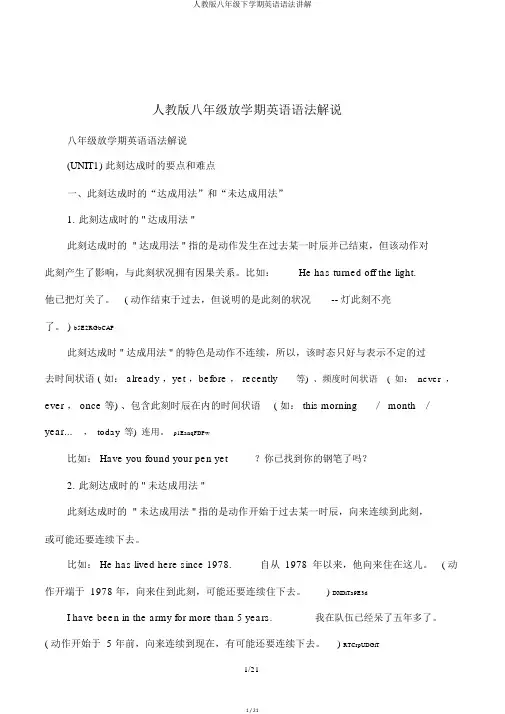
人教版八年级放学期英语语法解说八年级放学期英语语法解说(UNIT1) 此刻达成时的要点和难点一、此刻达成时的“达成用法”和“未达成用法”1.此刻达成时的 " 达成用法 "此刻达成时的 " 达成用法 " 指的是动作发生在过去某一时辰并已结束,但该动作对此刻产生了影响,与此刻状况拥有因果关系。
比如:He has turned off the light.他已把灯关了。
( 动作结束于过去,但说明的是此刻的状况-- 灯此刻不亮了。
) b5E2RGbCAP此刻达成时 " 达成用法 " 的特色是动作不连续,所以,该时态只好与表示不定的过去时间状语 ( 如: already ,yet ,before , recently等)、频度时间状语(如:never,ever , once 等) 、包含此刻时辰在内的时间状语( 如: this morning/month/year...,today等)连用。
p1EanqFDPw比如: Have you found your pen yet?你已找到你的钢笔了吗?2.此刻达成时的 " 未达成用法 "此刻达成时的 " 未达成用法 " 指的是动作开始于过去某一时辰,向来连续到此刻,或可能还要连续下去。
比如: He has lived here since 1978.自从1978年以来,他向来住在这儿。
( 动作开端于 1978 年,向来住到此刻,可能还要连续住下去。
) DXDiTa9E3dI have been in the army for more than 5 years.我在队伍已经呆了五年多了。
( 动作开始于 5 年前,向来连续到现在,有可能还要连续下去。
)此种用法的句中常需一个表示一段时间的状语( 由 since 或 for 指引 ) ,或表示与现在时辰相连的时间状语( 如: up to now , so far到当前为止)等。
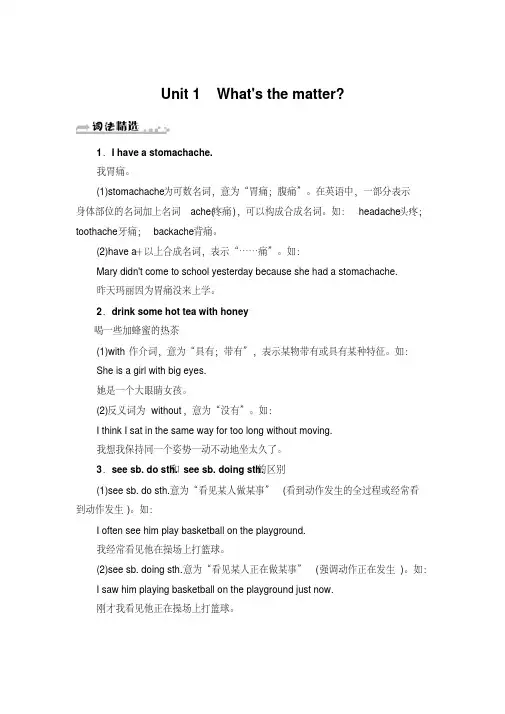
Unit 1What's the matter?1.I have a stomachache.我胃痛。
(1)stomachache为可数名词,意为“胃痛;腹痛”。
在英语中,一部分表示身体部位的名词加上名词ache(疼痛),可以构成合成名词。
如:headache头疼;toothache牙痛;backache背痛。
(2)have a+以上合成名词,表示“……痛”。
如:Mary didn't come to school yesterday because she had a stomachache.昨天玛丽因为胃痛没来上学。
2.drink some hot tea with honey喝一些加蜂蜜的热茶(1)with作介词,意为“具有;带有”,表示某物带有或具有某种特征。
如:She is a girl with big eyes.她是一个大眼睛女孩。
(2)反义词为without,意为“没有”。
如:I think I sat in the same way for too long without moving.我想我保持同一个姿势一动不动地坐太久了。
3.see sb. do sth.和see sb. doing sth.的区别(1)see sb. do sth. 意为“看见某人做某事”(看到动作发生的全过程或经常看到动作发生)。
如:I often see him play basketball on the playground.我经常看见他在操场上打篮球。
(2)see sb. doing sth. 意为“看见某人正在做某事”(强调动作正在发生)。
如:I saw him playing basketball on the playground just now.刚才我看见他正在操场上打篮球。
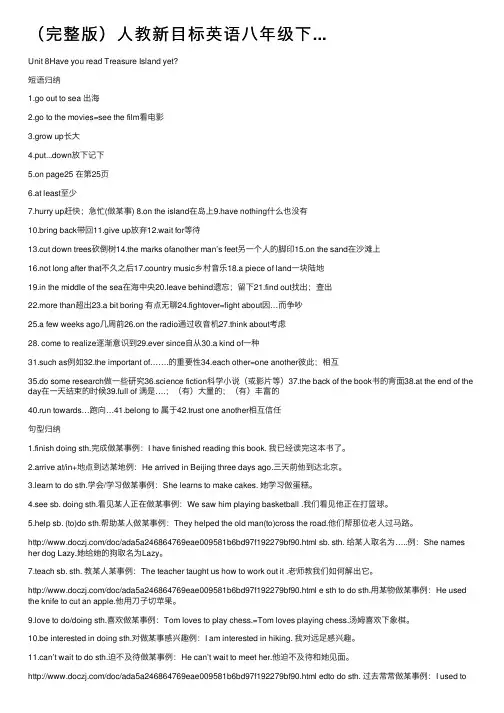
(完整版)⼈教新⽬标英语⼋年级下...Unit 8Have you read Treasure Island yet?短语归纳1.go out to sea 出海2.go to the movies=see the film看电影3.grow up长⼤4.put...down放下记下5.on page25 在第25页6.at least⾄少7.hurry up赶快;急忙(做某事) 8.on the island在岛上9.have nothing什么也没有10.bring back带回11.give up放弃12.wait for等待13.cut down trees砍倒树14.the marks ofanother man’s feet另⼀个⼈的脚印15.on the sand在沙滩上16.not long after that不久之后17.country music乡村⾳乐18.a piece of land⼀块陆地19.in the middle of the sea在海中央20.leave behind遗忘;留下21.find out找出;查出22.more than超出23.a bit boring 有点⽆聊24.fightover=fight about因…⽽争吵25.a few weeks ago⼏周前26.on the radio通过收⾳机27.think about考虑28. come to realize逐渐意识到29.ever since⾃从30.a kind of⼀种31.such as例如32.the important of…….的重要性34.each other=one another彼此;相互35.do some research做⼀些研究36.science fiction科学⼩说(或影⽚等)37.the back of the book书的背⾯38.at the end of the day在⼀天结束的时候39.full of 满是….;(有)⼤量的;(有)丰富的40.run towards…跑向…41.belong to 属于42.trust one another相互信任句型归纳1.finish doing sth.完成做某事例:I have finished reading this book. 我已经读完这本书了。
新目标英语八年级(下)重点短语及句型总Unit 1 Will people have robots?1. fewer people 更少的人(fewer 修饰名词复数,表示否定)2. less free time 更少的空闲时间(less 修饰不可数名词,表示否定)3. in ten years 10年后(in 的时间短语用于将来时,提问用 How soon)4. fall in love with … 爱上……例:When I met Mr. Xu for the first time, I fell inlove with him at once.当我第一次见到许老师,我立刻爱上他。
5. live alone 单独居住6. feel lonely 感到孤独(比较:live alone/ go alone 等)The girl walked alone along the street, but shedidn't feel lonely.那女孩独自沿着街道走,但她并不感到孤独。
7. keep/ feed a pet pig 养一头宠物猪8. fly to the moon 飞上月球9. hundreds of + 复数数百/几百(概数,类似还有 thousands of;millions of)10. the same as 和……相同11. A be different from B A与B不同(= There is a difference/ Thgere aredifferences between A and B)12. wake up 醒来(wake sb. up 表示“唤醒某人”)13. get bored 变得厌倦(get/ become 是连系动词,后跟形容词如 tired/angry/ excited 等)14. go skating 去滑冰(类似还有 go hiking/ fishing /skating/ bike riding 等)15. lots of/ a lot of 许多(修饰可数名词、不可数名词都可以)16. at the weekends 在周末17. study at home on computers 在家通过电脑学习18. agree with sb. 同意某人(的意见)19. I don't agree. = I disagree. 我不同意。
新目标英语八年级下册第一单元语法动词的一般时态(1)一般现在时一般现在时表示包括现在在内的经常性、习惯性的动作或状态,客观存在的普遍真理等。
常由实义动词的原形构成,在第三人称单数形式后加-(e)s,如:Sally has a dog. 萨莉有一只狗。
The moon travels around the earth. 月球绕着地球转。
常与一般现在时搭配使用的时间状语有:always, often, usually, every day等。
(2)一般过去时一般过去时表示过去某时发生的动作或情况,或表示过去习惯性的动作,一般由过去式表示。
如:Uncle Wang was very busy yesterday. 王叔叔昨天很忙。
Every night, the man upstairs came back late. 每天晚上,楼上的那个人都回来得很晚。
常与一般过去时连用的时间状语有:yesterday (evening), last night, two years ago, just now, at that time等。
(3)一般将来时本单元我们主要学习了一般将来时。
一般将来时表示将来某一时刻的动作或状态,或将来某一段时间内经常性的动作或状态。
常与一般将来时连用的时间状语有:tomorrow(morning), next week, in two days等。
它的表达形式可分如下几种:①用“will /shall+动词原形”表示对未来的预见。
口语中will可用于所有人称,书面语中第一人称(I, we)常用shall。
在口语中,will在名词或代词后常简缩为'll,否定式will not常简略为won't。
一般疑问句,把will /shall提到主语之前。
如:I shall (will) write you a letter next month. 下个月我会给你写信。
Will you please close the door? 请你把门关上好吗?Shall we go to the zoo at 9? 我们九点钟去动物园好吗?②用“be going to+动词原形”表示将来打算做的事情或者根据现存的各种因素推断很快要发生的事情。
梅花香自苦寒来Unit 2 I’ll help to clean up the city parks.【重点单词】clean up 打扫(清除)干净cheer [tʃiə] v. 欢呼cheer up 变得更高兴,振奋起来give out 分发,散发volunteer [ˌvɔlənˈtiə] n. & v. 志愿者;义务做come up with 想出,提出put off 推迟sign [saɪn] n. 标记,符号,标牌notice [ˈnəʊtɪs] n. & v. 通知,公告;注意到hand out 分发call up 打电话给…某人,征召used to do sth. 过去常常做某事lonely ['ləʊnlɪ] adj. 孤独的,寂寞的care for 照顾,非常喜欢several [ˈsevrəl] prep. 几个,数个,一些strong [strɒŋ] adj. 强壮的,强烈的feeling [ˈfi:lɪŋ] n. 感觉,感触satisfaction [ˌsætɪs'fækʃn] n. 满足,满意joy [dʒɔɪ] n. 高兴,愉快owner [ˈəʊnə(r)] n. 所有者,物主try out 参加…选拔,试用journey ['dʒɜ:nɪ] n. (尤指长途)旅行,行程raise [reɪz] v. 抬起,举起,筹集,征集alone [əˈləun] adv. 独自地,孤独地repair [riˈpɛə] v. 修理,修补fix [fiks] v. 修理,安装fix up 修理,修补give away 赠送,捐赠take after (外貌或行为)像broken ['brəʊkən] adj. 破损的,残缺的wheel [wi:l] n. & v. 轮子,车轮;旋转letter [ˈletə] n. 信件,字母Miss [mɪs] n. 小姐set up 建立,设立disabled [disˈeibəld] adj. 有残疾的,丧失能力的make a difference 影响,有作用blind [blaɪnd] adj. 盲的,盲目的,失明的deaf [def] adj. 聋的imagine [ɪˈmædʒɪn] v. 想象,设想difficulty ['dɪfɪkəltɪ] n. 困难open [ˈəʊpən] v. 打开door [dɔ:] n. 门carry ['kærɪ] v. 携带,搬运train [treɪn] v. 训练,培养training [ˈtreɪnɪŋ] n. 训练,培训excited [ɪkˈsaɪtɪd] adj. 激动的,兴奋的kindness [ˈkaɪndnəs] n. 仁慈,善良,亲切,善意clever [ˈklevə] adj. 聪明的,机灵的understand [ˌʌndəˈstænd] v. 懂,理解change [tʃeɪndʒ] n. & v. 改变interest ['ɪntrəst] n. & v. 感兴趣;兴趣sir [sɜ:(r)] n. 先生madam ['mædəm] n. 夫人,女士【重点短语】1.Clean-Up Day 清洁日2. an old people’s home 养老院3. help out with sth. 帮助解决困难4. used to 过去常常......5. care for 关心;照顾6. the look of joy 快乐的表情7. at the age of 在......岁时8.clean up 打扫(或清除)干净9. cheer up (使)变得更高兴;振奋10. give out 分发;散发11. come up with 想出;提出12. make a plan 制订计划13. make some notices 做些公告牌14. try out 试用;试行15. work for 为…工作;为…. 效力16. put up 建造;举起;张贴17. hand out 分发;散发;发给18. call up 打电话;召集19. put off 推迟;延迟20. for example 比如;例如21. raise money 筹钱;募捐22. take after 与......相像;像23. give away 赠送;捐赠24. fix up 修理;修补;解决25. be similar to 与……相似26. set up 建立;设立27. disabled people 残疾人28. make a difference 影响;有作用29. be able to 能够30. after-school reading program 课外阅读项目【重点句型】1. The boy could give out food at the food bank. 这个男孩可以在食品救济站分发食物。
人教版新目标英语八年级下册语法知识点讲解与经典习题汇编一、反身代词(Reflexive Pronouns):表示反射或强调的代词叫做反身代词。
3.反身代词的固定搭配:(A)动词之后:enjoy oneself help oneselfdress oneself teach oneselfhurt oneself lose oneselfmake oneself done(B) 介词之后: by oneself for oneselflook after oneself take care of oneselfsmile to oneself say/think to oneselfcome to oneself keep sth. to oneself4.经典习题:(1) Help to some ice cream and salad, kids.A.youB.yourselfC.yourselvesD.themselves(2)--Who teaches you maths ?--Nobody. I teach maths.A.meB.myC.mineD.myself(3)Children should learn how to save in times of danger.A.himselfB.themselvesC.yourselfD.ourselves(4)Mr. Green went to see his aunt with his wife .A.herselfB.himselfC.themselvesD.themself( 5) Both Mary and I learn Chinese by .A.herselfB.myselfC.ourselvesD.themselves(答案:1-5 CDBBC )二、情态动词(ModalVerbs):用来表示“提议、建议、请求”等意思的动词,情态动词无人称和数的变化,不能单独作谓语,后面必须加动词原形。
○A结合新目标人教版八年级英语下册Unit4谈谈直接引语和间接引语山东省东营市利津县汀罗镇第一中学张树梓邮编257452 首先同学们先从概念上理解直接引语和间接引语:直接引用别人的话叫直接引语,用自己的话转述别人的话叫间接引语。
间接引语在多数情况下构成宾语从句。
直接引语前后加引号,间接引语不必加。
现用课本中的句子解释如下:直接引语:Marcia said, “She is having a surprise party for Lana on Friday night.”Lana said, “I’m mad at Marcia.”间接引语:Marcia said that she was having a surprise party for Lana on Friday night.Lana said that she was mad at Marcia.2. 变直接引语为间接引语的方法:直接引语的主语是第一人称,改为间接引语后要根据意思改变人称,如:Lana said, “I’m mad at Marcia.”Lana said that she was mad at Marcia.注:若直接引语为陈述句,改为间接引语时,可以把that 省略。
(2)若主语谓语动词是一般过去时,直接引语变成间接引语要调整时态。
列表如下:直接引语间接引语现在时过去时现在完成时过去完成时过去完成时不变将来进行时过去将来进行时现在进行时过去进行时过去时过去完成时将来时过去将来时将来完成时过去将来完成时通过上表,同学们可以了解Grammar Focus中直接引语与间接引语的变化方式了,如下:Direct speech Reported speechI am mad at Marcia. She said she was mad at Marcia.I am having a party for Lana. She said she was having a party for Lana.I go to the beach every Saturday. He said he went to the beach every Saturday.I will call you tomorrow. He told me he would call me tomorrow the next day.I can speak three languages. She said she could speak three languages.注:若直接引语部分是一种客观事实时,时态不变,如:The teacher said, “The earth goes round the sun.该为间接引语:The teacher said that the earth goes round the sun.(3) 直接引语变间接引语时,指示代词、时间状语和动词也要作调整。
结合新目标人教版八年级英语下册Unit4
谈谈直接引语和间接引语
1.首先同学们先从概念上理解直接引语和间接引语:
直接引用别人的话叫直接引语,用自己的话转述别人的话叫间接引语。
间接引语在多数情况下构成宾语从句。
直接引语前后加引号,间接引语不必加。
现用课本中的句子解释如下:
直接引语:Marcia said, “She is having a surprise party for Lana on Friday night.”
Lana said, “I’m mad at Marcia.”
间接引语:
Marcia said that she was having a surprise party for Lana on Friday night.
Lana said that she was mad at Marcia.
2. 变直接引语为间接引语的方法:
(1)直接引语的主语是第一人称,改为间接引语后要根据意思改变人称,如:
Lana said, “I’m mad at Marcia.”
Lana said that she was mad at Marcia.
注:若直接引语为陈述句,改为间接引语时,可以把that 省略。
(2)若主语谓语动词是一般过去时,直接引语变成间接引
语要调整时态。
列表如下:
直接引语间接引语
现在时过去时
现在完成时过去完成时
过去完成时不变
将来进行时过去将来进行时
现在进行时过去进行时
过去时过去完成时
将来时过去将来时
将来完成时过去将来完成时
通过上表,同学们可以了解Grammar Focus中直接引语与间
接引语的变化方式了,如下:
Direct speech Reported speech
I am mad at Marcia. She said she was mad at Marcia.
I am having a party for Lana. She said she was having a party for Lana.
I go to the beach every Saturday. He said he went to the beach every Saturday.
I will call you tomorrow. He told me he would call me tomorrow the
next day.
I can speak three languages. She said she could speak three languages. 注:若直接引语部分是一种客观事实时,时态不变,如:
The teacher said, “The earth goes round the sun.
该为间接引语:The teacher said that the earth goes round the sun.
(3) 直接引语变间接引语时,指示代词、时间状语和动词也要作调整。
列表如下:
直接引语间接引语
指示代词this these that those
时间状语now
today
tonight
this week
yesterday
last week
three days ago
tomorrow
next week
then
that day
that night
that week
the day before
the week before
three days before
the next day
the next week
地点状语here there
动词come go
(4) 若直接引语为一般疑问句(即倒装语序,改为间接引语时要用陈述句语序,而且要用连词if或whether。
如本单元Self—check部分中的第二题中的“She asked me if she could copy my homework.”就是由直接引语“She asked me, ‘can I copy your homework?’”变化而来。
同时,如下句:
She asked her mum, “Can I go with you?”
She asked her mum if she could go with her.
以上是结合本单元对直接引语与间接引语的变化做了简单的介绍,同学们,你学会了么?做一下下面的题来自我检测一下吧!
把下列的直接引语改为间接引语:
1.He said, “Did you see him yesterday?”
2.He said, “The moon moves around the sun.”
3.She said, “I’m coming this afternoon”.
4.He said, “ I like it very much.”
5.She said, “ I have seen the film. It is good.”
6.Emily said, “Shall I do that?”
7.The waiter asked, “Is there anything else I can do?”8.John asked, “ Do you understand?”
9.He asked, “Are you a teacher or a student?”
10.He said , “I don’t smoke.”
参考答案:
1.He asked if I had seen him the day before.
2.He said that the moon moves around the sun.
3.She said that she was going that afternoon.
4.He said that he liked it very much.
5.She said she had seen the film and it was good.
6.Emily asked if she should do that.
7.The waiter asked if there was something else he could do. 8.John asked if I understood.
9.He asked if I was a teacher or a student.
10.He said that he didn’t smoke.。